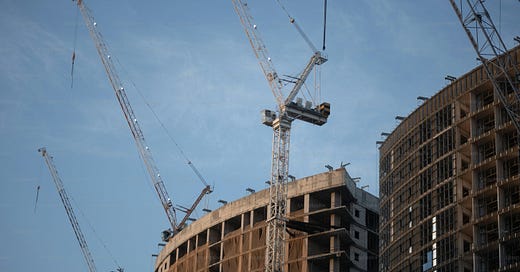With the public, each climate policy needs arguing on its own merits. Energy security works (for now) for new green generation, tackling air pollution for active travel. But we aren’t always talking to the public. The government is talking about growth, so we will too.

Those who want climate action have bought that it can be good for growth, not least because we have to build a lot of stuff. Biden has shown sceptics that growth and progressive outcomes are not mutually exclusive. Labour isn’t in opposition now. A lovely narrative that climate and growth are bedfellows isn’t sufficient to change government policy.
For Labour growth means increased investment. Ideally investment in physical things that the public can see. That was the focus of the investment summit, why they’ve gone big on planning and the reason for the fiscal rules debate.
But spending review quality evidence needs to move beyond - net zero is good for growth because we spend money on it and, can we please have some more money? Too often advocates lack a theory behind why net zero can be good for growth.
I’ve written about this before with Andrew Sissons from Nesta. I think there are (at least) three reasons our existing climate policies are good for growth.
Increased efficiency. Electrification normally means producing the same output more efficiently and therefore at lower cost. Good evidence that this is the case for EVs and heat pumps.
Increased domestic consumption. A chunk of oil and gas expenditure goes abroad, whereas electricity is produced closer to home - provided you aren’t spending more overall - investing domestically is better for UK GDP.
High growth sectors. This is the most well-evidenced. Green sectors are growing rapidly and the UK could capture some of that market and therefore the export potential. But there are two often overlooked factors beneath this. These sectors are not just growing - they are also more productive. Renewable energy for example is an innovation-intensive sector, and very highly skilled.
Moving beyond rhetoric to more evidence will though expose that climate and growth are not always in lockstep. Take housebuilding. Building lots of houses fast will boost growth, primarily through increased investment from developers, but also because people buy those houses. If we build them in the right places, housing can also help increase the size of local labour markets, making it easier for people with the right skills to be in the right places.
Now, as my colleague Jack Airey has pointed out, developers' profit margins aren’t huge. They may argue that to build 1.5 million homes, they need to be low-cost. That might dissuade government from implementing the Future Homes Standard or mandating a high-energy performance.
Cheap houses, built quickly, give government its investment influx and a nice boost to aggregate demand. But, low-quality housing has economic implications. Households spending more on energy bills isn’t a productive use of capital. Low-quality housing shifts the cost of upgrades to the consumer. There’s a reason banks are looking to green their mortgage books - it stores up significant financial risk.
There will be lots of examples like this. Cutting taxes on oil and gas might bring some investment forward, but you’d be hard-pressed to say that’s good for long-run growth. Roads have a very high GVA. But we know that new roads induce demand, congestion and pollution. Fitting CCUS is probably a short-run productivity hit - increasing costs for the same output - but might help in the long run, backing an export potential.
This is why industrial strategy is so important, it’s about structuring decision-making to say, we want more of this and less of that. Growth yes, but with direction. Climate advocates can’t ignore trade-offs. They need unpacking to inform decision-making, what constituent parts of growth are going up or down, over what timescale? Missions are about focusing policy to achieve outcomes. They should lead you to clarity on what you are or aren’t doing in the name of growth.
Growth isn’t the best message for rationale for climate full stop, it’s just the one that is going to drive decisions now. Our narrative on climate needs to constantly evolve, and I’m particularly worried that growth, particularly investment in stuff, is not what works for the public. In PF polling only 13% of people said growth would mean improvements to infrastructure (11th out of 17 options) versus 33% who think it’s buying more things, or 29% hiring more workers.
I’d much rather something focused on everyday improvements in people’s lives, tailored to each policy. Not least because the public is much more likely to say it is the rich (40%) or big businesses (47%) that benefit from growth over everyone (31%) or low-income earners (12%). The day-to-day is very this Labour, but unfortunately, it's not very Treasury.





